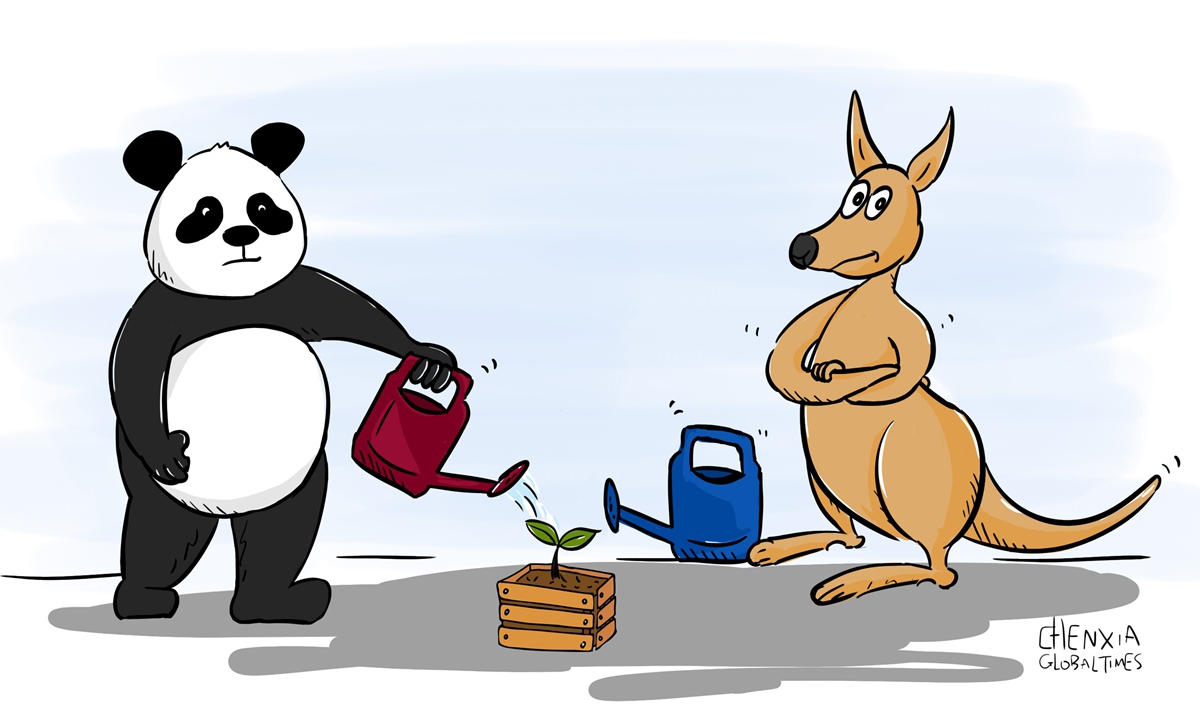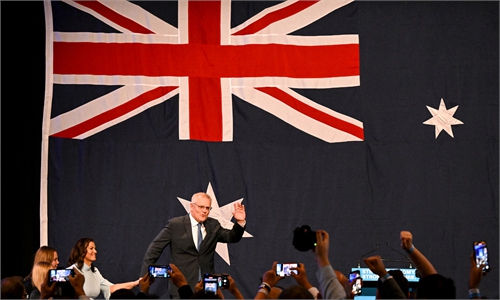With lawmakers' Taiwan visit, Australia should stop playing with fire before the fire starts to burn

Illustration: Chen Xia/GT
According to media reports, a delegation of Australian members of parliament (MPs) arrived in the island of Taiwan on Sunday. The six-member delegation includes members of the center-left ruling Labor Party, as well as the conservative opposition Liberal Party and its ally the National Party.The visit comes at a time when China and Australia are endeavoring to mend bilateral ties which have dropped to the lowest ebb in the past three years. Just last month, Chinese State Councilor and Foreign Minister Wang Yi had a phone conversation with Australian Foreign Minister Penny Wong. Then on the sidelines of the G20 summit, Chinese and Australian heads of state met, which analysts believe will help end the diplomatic deep freeze between the two countries. The meeting was described by Australian Prime Minister Anthony Albanese himself as "positive and constructive."
Undoubtedly, the Australian lawmakers' visit to Taiwan will cast a shadow on the China-Australia relationship that has seen some positive momentum just recently. Chen Hong, president of the Chinese Association of Australian Studies and director of the Australian Studies Centre at East China Normal University, told the Global Times that the visit - a provocative act by some anti-China forces in Australia - serves to show unity with some forces in some countries that supports the "Taiwan independence."
The visit comes right after some British lawmakers' visit to Taiwan, and it shows that in Australia there are also forces that side with 'Taiwan independence,' trying to create an embarrassing scenario for China," said Chen. "Meanwhile, the visit stresses 'bipartisan' as it has members from both parties. Also, as each lawmaker represents their own constituency, this creates a false impression that it is the Australian public's opinion to support 'Taiwan independence.'"
After the media exposure of the visit, Albanese has tried to play down the significance of the visit, saying that it is a "backbench" delegation and that the visit is not a "government" one.
But Qin Sheng, executive research fellow at the Center for Australia, New Zealand and South Pacific Studies, Chinese Academy of Social Sciences, believes that although these lawmakers do not hold cabinet positions, they have strong party affiliations and government background and their behavior is inevitably part of the government's behavior. Chen also believes that as the delegation is scheduled to meet Taiwan regional leader Tsai Ing-wen and the island's senior official in charge of external affairs Joseph Wu to discuss issues such as security, the visit goes far beyond the ordinary people-to-people exchanges under the one-China principle.
Albanese also reiterated Australia's bipartisan support of the one-China policy, but against the backdrop of this bipartisan visit, such reiteration sounds pale and more like a game of words. Albanese did not explicitly oppose the visit, but adopted an ambiguous attitude - he himself played down the visit in the hope of letting it go without attracting too much attention.
Lithuania's experience provides a cautionary tale for Australia. Since May 2021, Lithuania has pushed its relations with China to the edge of a cliff. It has not only provoked China in matters relating to Taiwan and Xinjiang, but also sent ministerial-level officials to Taiwan. Worse, it even allowed Taiwan to open a "Taiwanese Representative Office" in its capital Vilnius. Nonetheless, according to Lithuanian Radio and Television (LRT) on Wednesday, Lithuania's Economy Minister Aušrinė Armonaitė told local media in late November that "it's impossible to completely eliminate China" and he hoped that "trade with this country will recover." As early as in January, Lithuanian President Gitanas Nauseda admitted that Lithuania has made a mistake by allowing Taiwan to open an office in Vilnius.
Those who play with fire will perish by it. The politicians from certain countries who visit Taiwan to seek limelight are like political god of plague and pestilence. They bring nothing but risks and tension to Taiwan and no benefit to their own countries, and they also hijack their own countries' China policy. As the Australian MPs' Taiwan visit is under way, it has already generated negative impacts on the China-Australia relationship.
Chen said that Australia should start to think about how to repair ties before China responds to the visit in a firm and harsh manner, and that is what a responsible and accountable government is supposed to do. Australia should stop playing with fire before the fire starts to burn.



